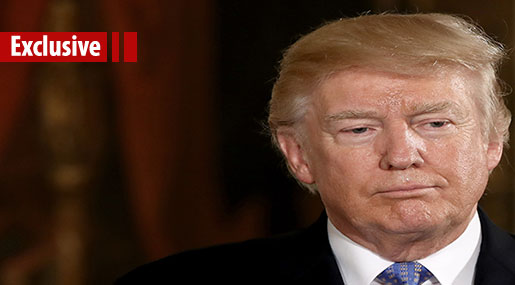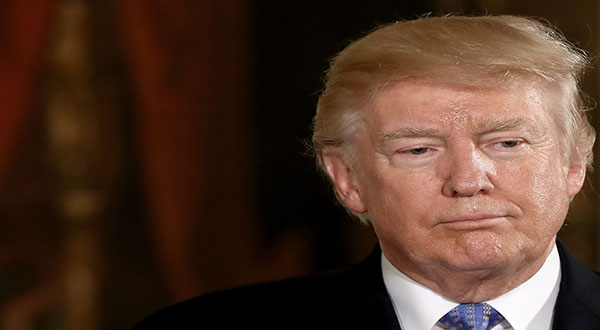
Washington Isolated as Trump Goes after the JCPOA

Darko Lazar
Washington's envoy to the UN, Nikki Haley, has been labeled as Donald Trump's "Iran whisperer".

In an October 13 article, Politico claims that Haley asked Trump to let her make the case for the decertification of the Joint Comprehensive Plan of Action (JCPOA), better known as the Iran nuclear deal.
"Let me lay a foundation for it," she told the US president during a meeting back in July, according to a Politico source.
Just a few months earlier, Haley - one of the most vocal public proponents of scrapping the Iran deal - was busy thrilling a crowd at the annual event of the pro-"Israel" lobbying group, AIPAC.
Addressing almost 18,000 AIPAC members, the American diplomat took issue with the nuclear accord, stating that it had "emboldened Iran".
Haley's position on the JCPOA has been a major source of contention between the UN Ambassador and her boss, Secretary of State Rex Tillerson, as well as Secretary of Defense James Mattis.
Both Mattis and Tillerson were reportedly among those advocating for the US to remain party to the agreement.
But in "Israel", Haley's rhetoric made her the "rock star to the Jews and their knight in shining armor," as one Haaretz correspondent put it.
After all, Haley's position on the JCPOA is a lot closer to that of the "Israeli" Prime Minister, Benjamin Netanyahu, than to the US State Department, which she supposedly works for.
Of course, Haley is hardly the only figure in Trump's inner circle championing the "Israeli" crusade against Tehran. There are many others - far more influential personalities, including the veteran US politician Henry Kissinger, as well as a key contributor to Trump's campaign, and Las Vegas mogul Sheldon Adelson.
In 2013, Adelson - a Jewish billionaire - suggested that the US should detonate a nuclear bomb in the Iranian desert as a show of force.
So, it is perhaps not surprising that Trump's nonsensical anti-Iran rant last week, which followed his refusal to certify the nuclear agreement, was only applauded by Netanyahu and a few of his partners in the Persian Gulf.
While pleasing a close friend, Trump's attempt to jeopardize the JCPOA is not exactly doing American business interests any favors, as it undermines deals between Iran and US companies worth billions of dollars.
Putting ‘"Israel" First' also weakens the US globally, as the White House opens up new battlefronts, not just with Iran, but all the other signatories to the nuclear accord.
Former US diplomat Jim Jatras warned that the move will "further estrange Washington and its European allies".
"As things stand now, the Iranians have the support of the Russians, the Chinese and all of our European allies, and it's Washington that is isolated".
Eurasian connectivity
The 2015 landmark nuclear agreement is a product of nine years of very tough negotiations. But it was not only the US that painstakingly negotiated the terms of the deal with Iran. Rather, it was the combined efforts of Russia, China, Britain, France, Germany, and the UK.
Following Trump's claims about Tehran's supposed violations of the accord - disputed by the UN nuclear watchdog - Iran's President, Hassan Rouhani, reminded his American counterpart that no single leader has the power to annul a global agreement.
"Can a president annul a multilateral international treaty on his own?" Rouhani asked. "Apparently he doesn't know that this agreement is not a bilateral agreement solely between Iran and the United States."
The EU's foreign policy chief echoed the same sentiment.
"This deal is not a bilateral agreement," Federica Mogherini said. "We cannot afford as the international community to dismantle a nuclear agreement that is working."
Meanwhile, the UK, France and Germany issued a joint statement, warning Washington against harming the deal, whilst Moscow said that Trump's actions expose the US as an unreliable partner.
According to Roozbeh Aliabadi, a partner with a consulting group, Global Growth Advisors, the nuclear deal "is no longer about the United States".
"It's about Eurasian connectivity. Iran sits on the cross center of Eurasian connectivity. The Europeans, Russians and Chinese have a greater stake here and they are not going to walk away from this deal," Aliabadi opined. "I think that the US will, in a way, be excluded from the broader agreement with Iran."
Using the JCPOA as a bargaining chip
The Trump administration's true quarrel with Iran has nothing to do with the nonexistent threat from Tehran's nuclear program. Instead, it is focused on Iran's broader policies in the Middle East, which have frustrated US and "Israeli" objectives in places like Lebanon, Syria, and Iraq.
This is best exemplified by one of the key features of Trump's broader anti-Iran agenda - the imposition of new sanctions against the Islamic Revolutionary Guard Corps [IRGC].
The powerful military organization has been instrumental in suppressing US-backed terrorist groups in the Middle East through its support for Tehran's allies across the region.
After more than six years of bloodletting in Syria, both the Americans and the "Israelis" know full well that they simply lack the resources to engage in any sort of direct military confrontation with the IRGC. As such, any kind of conventional clash is a nonstarter.
The next best thing is blackmail and sanctions.
Aside from attempting to use the JCPOA to make up for backtracking on so many election promises, Trump is also hoping to utilize the agreement as a bargaining chip in a region where US influence is on a downward spiral.
Trump and his backers are looking to broaden the scope of the deal to include Iran's ballistic missile program, as well as Tehran's regional alliances.
It appears that Tehran did not wait long to respond to the latest proposal from Washington. Speaking only moments after Trump, President Rouhani said that, "the Iranian nation has not and will never bow to any foreign pressure... Iran's Islamic Revolutionary Guards Corps will continue its fight against regional terrorists".
Source: Al-Ahed News



